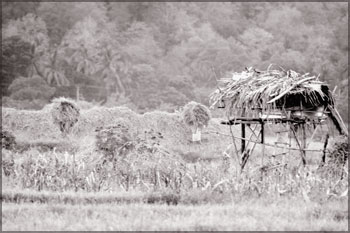Designation: Temporary farm-hand
by Aditha Dissanayake
Remember how the protagonist in George Orwell's Keep the Aspidistra
Flying goes around telling everyone "I am a writer and a freeman" I
tried recently to see if I could do the same and ended up working as a
temporary farmhand in a 25 acre farm in Serukelle.
My day begins on Saturday morning, when, having travelled to Adigama
by bus, and after trudging on a dust covered road for twenty minutes I
land on the doorstep of the Manager, who at the introduction of one of
my batch mates had reluctantly agreed to let me work on his farm. He is
willing to pay me Rs. 300.00 per day, with lunch and two
cups of plain tea and expects me to be cutting the paddy, gathering
it and making it ready for winnowing on his one acre pf paddy land with
six other villagers.
|

Pic by Thilak Perera |
Clad in a faded denim and long-sleeved t-shirt and looking as though
he is a member of the national rugger team, he barely hides his doubts
about how competent I might be in bringing his precious harvest home.
He does not believe my educational qualifications, and experience
earning a living with the weapon of mass description, will be of any use
on his paddy fields.
But when one of the regular workers, Malkanthi sends word through her
sister saying her husband Kiri Chooti requires her help today because
one of his cows are in labour, and so, she will not be able to come to
work, he has no choice other than to allow me to fill the vacancy. When
I join my colleagues on the field, the first to react is the oldest
among them. 'Tck" says Ariyawathi giving a disapproving look at my
attire.
Obviously someone who does not believe in the comfort and convenience
of a faded denim and a cotton shirt, she removes the piece of cloth she
has tied round her head and gives it to me asking me to tie it round my
waist.
I oblige her for a few minutes but give up when the cloth begins to
slip down my thighs every five minutes making the others laugh saying 'Onna,
aiy watuna" (there it comes down again).I step onto the paddy field
trying to recall Maestro Amaradeva's song about the golden coloured
grains...ranwan ranwan...? No, that is not the one...before I can recall
the right words, work begins, with the leader of our team, Sunil saying
O.K lets start (patanganilla). On my first attempt I manage to cut five
or six grains of paddy.
Jeevan who is standing next to me laughs good naturedly and suggests
'Hold a bunch of paddy in your left hand take the knife into you right
hand, then, with one clean sweep, cut the stems".
It seems easy when you watch, but try it for yourself and you realize
editing copies with unbelievable grammatical mistakes on a Thursday
evening with only hours to go before the final deadline at the Sunday
Observer is nothing compared to this. 'One shot, none stop" Jeevan
teaches me the mantra of the paddy harvesters.
Standing knee deep in mud, bending double to reach the paddy,
everyone works in dead silence. Except for the srrrrrs, srrrrrrs sound
made by the knives and the occasional call of a peacock there is no
other sound around us.
"Aren't there songs to sing when you harvest the paddy?" I finally
break the silence wondering whether it is a taboo to talk on the paddy
field and that this could be why everyone is silent. 'Yes, there are
goyam kavi, but I don't know any of 'em' confesses Nilantha, who is
surely a modern farm-hand with a waterproof watch round his wrist and a
camera phone in his pocket.
"Umba apple malak vaage?" begins Jeevan, but stops in mid sentence
when he sees the Manager walking towards us to joins us and finish one "liyadda"
while talking with Sunil about giving a dane at the temple with the
newly harvested rice.
Having already stopped for the tea break, work continues till lunch,
the Ambula, is served under the shade of a murunga tree. The meal has
the traditional curries prepared during the harvesting season ? pumpkin
curry, dried fish and cabbage leaves.
While the men continue cutting the paddy, the women gather the cut
bundles to form a mountain of paddy. This is called 'kola karanawa'.
'Things were different in the past" says Ariyawathi.
'When I was a lass, the paddy was gathered into a Kamatha and no
woman was allowed to step into it". Today a machine which the villagers
call the "Agrimat" does all the work from separating the grains to
winnowing, while the final phase of milling the rice too is done at a
rice mill in the town.
Work comes to a stop at dusk with a dip in the village tank. It is
almost eight in the night when I return home.
I wonder if I should go back next Saturday too for another stint as a
farmhand. But, like how Chesterton said, if you are a street sweeper, be
the best street sweeper in the world. And I know I will never make it on
the paddy fields of Chilaw.
[email protected]
|
